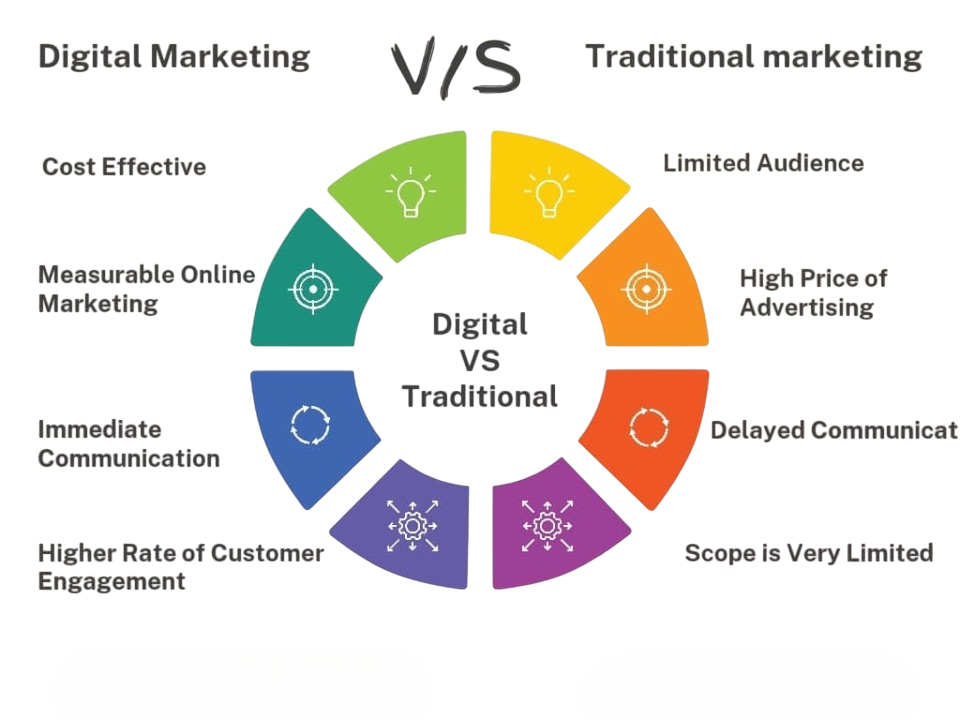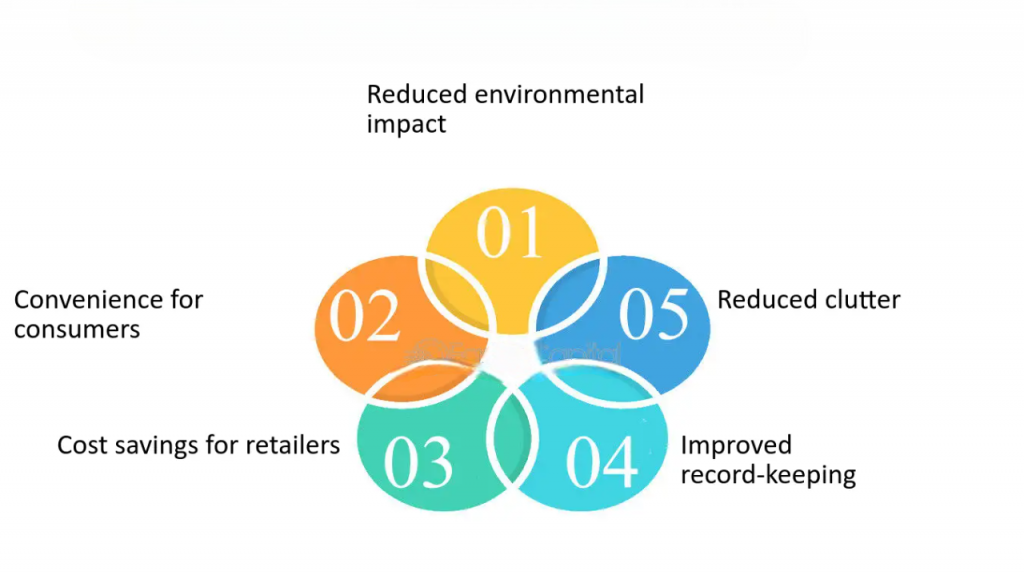
- The Digital Shift
- Traditional vs Digital Marketing
- Digital Marketing Penetration
- Benefits of Going Digital
- Rise of Mobile and Internet
- Content-Driven Economy
- E-commerce & Digital Ecosystem
- Conclusion
The Digital Shift
The way businesses connect with consumers has undergone a massive transformation over the past two decades. Traditional marketing methods such as print advertising, billboards, and direct mail are no longer sufficient on their own. The digital era has ushered in an era of hyper-connectivity where consumers spend hours every day on digital platforms, Google Analytics Explained from social media to search engines. This shift has forced businesses to rethink their marketing strategies, placing a greater emphasis on digital channels. As a result, the phrase “All Marketing Will Be Digital Marketing Soon” has become more relevant than ever. Digital marketing isn’t just an option; it’s a necessity. With the rise of smartphones, the internet, and data-driven strategies, companies have realized the immense potential of reaching audiences through digital platforms. The digital shift isn’t only changing how companies advertise, it’s changing consumer behavior, expectations, and the very fabric of business-customer interaction.The digital shift refers to the widespread transition from traditional, analog methods to digital technologies in nearly every aspect of life and business. This transformation is driven by advancements in the internet, smartphones, cloud computing, and artificial intelligence. In the business and marketing world, the digital shift has changed how companies interact with customers, moving from print and broadcast advertising to Digital Marketing Training channels like social media, email, SEO, and online advertising. It has also led to the rise of e-commerce, online customer service, and data-driven decision-making. On a societal level, the digital shift has impacted how people communicate, work, learn, and shop, with remote work, online education, and digital payments becoming the norm. This ongoing shift requires both individuals and organizations to adapt by developing digital skills and embracing new tools and platforms. Ultimately, the digital shift is not just about technology it’s about rethinking how we connect, operate, and compete in a fast-paced digital world.
Ready to Get Certified in Digital Marketing? Explore the Program Now Digital Marketing Online Training Offered By ACTE Right Now!
Traditional vs Digital Marketing
Traditional marketing includes channels like television, radio, newspapers, and magazines. These mediums are one-way in nature, offering limited interactivity. Brands broadcast messages, and the audience consumes them passively. While these methods can be effective for broad reach, they often come with high costs and minimal targeting capabilities. Digital marketing, on the other hand, operates through channels like social media, search engines, email, and websites.

It’s interactive, measurable, and customizable. Brands can now engage in real-time conversations with consumers, Display Advertising gather feedback, and refine their strategies quickly. Moreover, digital marketing allows precise targeting marketers can define their audiences by age, gender, location, interests, and behavior, making campaigns more efficient and cost-effective. While traditional marketing still has its place in some sectors, especially where brand visibility or emotional storytelling is important (like TV commercials), digital marketing offers a dynamic, flexible, and scalable approach to reaching modern audiences.
Digital Marketing Penetration
Digital Marketing Penetration of digital marketing is astounding. According to DataReportal, over 5 billion people use the internet, and more than 4.6 billion are active social media users. This widespread digital connectivity makes digital marketing one of the most accessible and powerful tools for businesses worldwide. In developed countries, businesses allocate more than 60% of their total marketing budgets to Digital Marketing Training . Emerging markets are not far behind, with rapid smartphone adoption and growing internet accessibility. Platforms like Facebook, Instagram, TikTok, YouTube, and Google have made it easier than ever to target users, regardless of geographical location. What’s more, digital marketing reaches customers where they spend most of their time online. Whether they’re watching videos, reading articles, or shopping online, digital platforms serve as constant touchpoints for brand interaction.Traditional marketing and digital marketing are two distinct approaches used by businesses to reach and engage with their target audiences. Traditional marketing involves offline methods such as television, radio, newspapers, magazines, billboards, and direct mail. These channels have been used for decades and are effective for reaching a broad, local audience. However, they often require a large budget and provide limited ways to measure audience response or campaign performance. In contrast, digital marketing uses online platforms like social media, email, websites, search engines, and mobile apps to promote products or services. It allows businesses to target specific demographics, track user behavior, and analyze campaign results in real time. Digital marketing is generally more cost-effective, Digital Marketing Career interactive, and scalable than traditional marketing. While traditional methods are still valuable for certain industries and audiences, digital marketing offers more flexibility, personalization, and global reach. In today’s digital-first world, most successful marketing strategies combine elements of both to maximize impact and return on investment.
To Explore Digital Marketing in Depth, Check Out Our Comprehensive Digital Marketing Training To Gain Insights From Our Experts!
Benefits of Going Digital
The benefits of digital marketing are multifaceted:
- Cost-Effectiveness: Compared to traditional advertising, digital campaigns can be launched on a smaller budget and scaled as needed.
- Measurable Results: Tools like Google Analytics and social media insights allow marketers to track performance in real-time.
- Personalization: Businesses can tailor content and offers based on user behavior and preferences Click-Through Rate in Digital Marketing.
- Wider Reach: Digital platforms enable global outreach without physical boundaries.

These advantages make digital marketing an indispensable part of any modern business strategy.
Rise of Mobile and Internet
- The rapid growth of smartphones has made mobile access to the internet widespread and convenient.
- Mobile devices are now the primary source of internet usage for many people globally. The expansion of 4G and 5G networks has improved mobile internet speed and reliability.
- Increased mobile usage has changed consumer behavior, including how people shop, search, and communicate.
- Mobile apps and mobile-friendly websites are essential for businesses to stay competitive.
- Social media, messaging apps, and video streaming are heavily accessed through mobile devices.
- Mobile marketing, including SMS, push notifications, Technical SEO and in-app ads, has become a major digital strategy.
- The internet has enabled instant access to information, e-commerce, and cloud-based services.
- Internet and mobile penetration have created new markets and opportunities, especially in emerging economies.
- Businesses must adopt mobile-first and internet-driven approaches to remain relevant and user-focused.
Looking to Master Digital Marketing? Discover the Digital Marketing Expert Masters Program Training Course Available at ACTE Now!
Content-Driven Economy
We now live in a content-driven economy where content is the currency of marketing. Whether it’s a blog post, an Instagram Reel, a YouTube video, or a podcast, content serves as the bridge between brands and audiences. Digital platforms reward valuable and engaging content. Algorithms on social media platforms prioritize content that is relevant, helpful, and engaging. This puts pressure on brands to move beyond promotional messages and create content that educates, entertains, or solves problems. Content marketing is not just about volume; it’s about relevance. Companies are investing in content strategies that map customer journeys, address pain points, and build long-term relationships. From storytelling to interactive experiences, content is the heartbeat of digital marketing success.In today’s digital age, Google’s Match Type Changes we are living in a content-driven economy, where content plays a central role in influencing consumer behavior, business decisions, and brand growth. This shift means that information delivered through blogs, videos, social media posts, podcasts, and other formats has become a key driver of value and engagement. Consumers now rely on content not just to discover products, but to compare, learn, and connect with brands on a deeper level. Businesses, in turn, use content marketing strategies to attract attention, build trust, and guide potential customers through the buying journey. In a content-driven economy, quality, relevance, and consistency of content are crucial for standing out in a crowded digital space. Moreover, platforms like YouTube, Instagram, and TikTok have created new opportunities for creators, influencers, and brands to monetize content and reach global audiences. As attention becomes one of the most valuable currencies, content is no longer just a marketing tool it’s a core business asset.
E-commerce & Digital Ecosystem
- E-commerce refers to the buying and selling of goods and services online. It enables businesses to reach a global customer base 24/7.
- Online marketplaces like Amazon, Flipkart, and Shopify power much of global e-commerce.
- The digital ecosystem includes all online tools, platforms, and technologies that support e-commerce.
- Key elements include websites, mobile apps, payment gateways, logistics platforms, and customer service tools.
- Social media and search engines play a major role in driving traffic to e-commerce platforms.
- Digital wallets and UPI have simplified online payments, Benefits of being a Content Marketer especially in mobile commerce.
- AI and data analytics help personalize customer experiences and improve decision-making.
- Cloud computing supports scalability and data storage for online businesses.
- A strong digital ecosystem ensures seamless operations, better customer satisfaction, and competitive advantage in the e-commerce industry.
Preparing for Digital Marketing Job Interviews? Have a Look at Our Blog on Digital Marketing Interview Questions and Answers To Ace Your Interview!
Conclusion
The line between traditional and digital marketing is becoming increasingly blurred and digital is taking over. As consumer habits shift toward online platforms, brands must evolve accordingly. Digital Marketing Training is no longer just a part of the marketing mix; it is the marketing mix. Whether it’s a startup or a global enterprise, every business needs a digital-first strategy to survive and thrive in today’s fast-paced, tech-driven world. From cost efficiency and personalization to analytics and automation, digital marketing offers unmatched advantages. And as tools, platforms, and customer behaviors evolve, marketers must stay adaptive and innovative. The future of marketing is digital. The sooner businesses accept and act on this reality, the better positioned they will be to build sustainable growth and meaningful customer relationships in the years to come.




